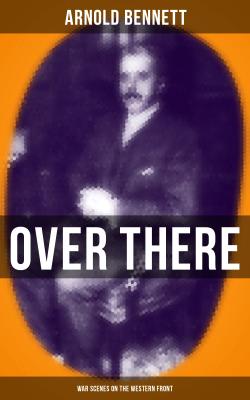OVER THERE (War Scenes on the Western Front). Bennett Arnold
Чтение книги онлайн.
Читать онлайн книгу OVER THERE (War Scenes on the Western Front) - Bennett Arnold страница 4
 though closed on that afternoon. We turned a corner, and came upon the church. The work on the church was well up to the reported Teutonic average. Of its roof only the rafters were left. The windows were all smashed, and their lead fantastically twisted. The west door was entirely gone; a rough grille of strips of wood served in its stead. Through this grille one could see the nave and altar, in a miraculous and horrible confusion. It was as if house-breakers had spent days in doing their best to produce a professional effect. The oak pews were almost unharmed. Immediately behind the grille lay a great bronze bell, about three feet high, covered with beautifully incised inscriptions; it was unhurt.
though closed on that afternoon. We turned a corner, and came upon the church. The work on the church was well up to the reported Teutonic average. Of its roof only the rafters were left. The windows were all smashed, and their lead fantastically twisted. The west door was entirely gone; a rough grille of strips of wood served in its stead. Through this grille one could see the nave and altar, in a miraculous and horrible confusion. It was as if house-breakers had spent days in doing their best to produce a professional effect. The oak pews were almost unharmed. Immediately behind the grille lay a great bronze bell, about three feet high, covered with beautifully incised inscriptions; it was unhurt.
Apparently nothing had been accomplished, in ten months, towards the restoration of the church. But something was contemplated, perhaps already started. A polished steel saw lay on one of the pews, but there was no workman attached to it.
While I was writing some notes in the porch three little boys came up and diligently stared at me.
"What dost thou want?" I said sharply to the tallest.
"Nothing," he replied.
Then three widows came up, one young, one young and beautiful, one middle-aged.
We got back into the carriage.
"The village seems very deserted," I said to the driver.
"What would you?" he answered. "Many went. They had no home.
Few have returned."
All around were houses of which nothing remained but the stone walls.
The Germans had shown great prowess here, and the French still greater. It was a village upon which rival commanders could gaze with pride. It will remember the fourth and the fifth of September 1914.
We made towards Chambry. Chambry is a village which, like Meaux, lies below the plain. Chambry escaped glory; but between it and Barcy, on the intervening slope through which a good road runs, a battle was fought. You know what kind of a battle it was by the tombs. These tombs were very like the others—an oblong of barbed wire, a white flag, a white cross, sometimes a name, more often only a number, rarely a wreath. You see first one, then another, then two, then a sprinkling; and gradually you perceive that the whole plain is dotted with gleams of white flags and white crosses, so that graves seem to extend right away to the horizon marked by lines of trees. Then you see a huge general grave. Much glory about that spot!
And then a tomb with a black cross. Very disconcerting, that black cross! It is different not only in colour, but in shape, from the other crosses. Sinister! You need not to be told that the body of a German lies beneath it. The whole devilishness of the Prussian ideal is expressed in that black cross. Then, as the road curves, you see more black crosses, many black crosses, very many. No flags, no names, no wreaths on these tombs. Just a white stencilled number in the centre of each cross. Women in Germany are still lying awake at nights and wondering what those tombs look like.
Watching over all the tombs, white and black without distinction, are notices: "Respect the Tombs." But the wheat and the oats are not respecting the tombs. Everywhere the crops have encroached on them, half-hiding them, smothering them, climbing right over them. In one place wheat is ripening out of the very body of a German soldier.
Such is the nearest battlefield to Paris. Corporate excursions to it are forbidden, and wisely. For the attraction of the place, were it given play, would completely demoralise Meaux and the entire district.
In half an hour we were back at an utterly matter-of-fact railway station, in whose cafe an utterly matter-of-fact and capable Frenchwoman gave us tea. And when we reached Paris we had the news that a Staff Captain of the French Army had been detailed to escort us to the front and to show us all that could safely be seen. Nevertheless, whatever I may experience, I shall not experience again the thrill which I had when the weak and melancholy old driver pointed out the first tomb. That which we had just seen was the front once.
Конец ознакомительного фрагмента.
Текст предоставлен ООО «ЛитРес».
Прочитайте эту книгу целиком, купив полную легальную версию на ЛитРес.
Безопасно оплатить книгу можно банковской картой Visa, MasterCard, Maestro, со счета мобильного телефона, с платежного терминала, в салоне МТС или Связной, через PayPal, WebMoney, Яндекс.Деньги, QIWI Кошелек, бонусными картами или другим удобным Вам способом.